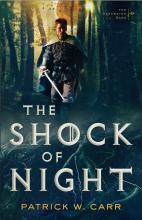inspiration + perspiration = invention :: T. Edison ::

Patrick W. Carr isn't resting on the laurels garnered by his previous fantasy series. In The Shock of the Night, the first of a brand new saga appropriately titled Darkwater, he reaches new heights as an author, crafting a rich setting full of vivid characters with stakes to match. At the risk of sounding hyperbolic, I'd say he also pushes Christian fantasy in a stronger direction, able to bridge the gap between exuberant optimism and grimdark dreariness (more on that in tomorrow's post). Add all that to a potent mystery tackled by a wonderfully irascible sleuth, and I know what sequel I am most looking forward to in the new year.
It's difficult to offer a summary of the book that doesn't completely give away the first major surprise. Indeed, I'd recommend potential readers who want an introduction to the world bypass any potential spoilers by simply reading Carr's delightful prequel novel (free on Amazon).
The main facts are these: Willet Dura was a lowly reeve charged with keeping the King's peace in the capital city of Bunard. At the start of The Shock of the Night, he's been elevated to the lowest of Lords due to services rendered to the crown, and is engaged to the lady of his heart, while also retaining the title of King's reeve, charged with unraveling the knottiest mysteries to face the kingdom. But he'll need all his wits and more to tackle the problem that lands in his lap after an unusual murder results in a power struggle between forces both known and unknown.
Carr has always been good at worldbuilding. Here he again draws an environment in which the theological and political aspects are just as developed as the fantastic. Rather than a monolithic church that is either the sole voice of God or the corruption of such an institution, Carr envisions a world with various theological factions and orders which must form shifting alliances to keep their positions (and all of which have checkered pasts). The King is akin to those of the Old Testament: divinely appointed, but ruling by the most tenuous threads of support. The nobility roil with a desire for more power, and a new class of merchants are rising up to grasp at their share of influence.
In fact, I'd say Carr's world isn't so much medieval as it is one in the first throes of early Renaissance-era upheaval and uncertainty. Certainly many fantasies should be more associated with later historic periods than the Middle Ages, but few have achieved such an authentic sense of place and time as Carr develops.
Willet is a great fantasy detective, echoing the hardboiled gumshoe while still being very much a part of his fantasy setting. He's got a hunger to do the right thing but often stumbles to see past his own desires (even noble ones) in his pursuit. Sharp in his deductions but not preternaturally more intelligent than others, Willet is willing to embrace the help of allies but driven by his own sense of justice to pursue the truth past the endurance (and often patience) of others. Not to mention he has a wicked sense of dark humor.
Nearly all the characters inhabiting this world show the same level of complexity. Part of a good mystery is not being able to immediately identify friend from foe, in sifting through competing motivations. The novel does an excellent job of assembling such a cast, all of whom have something to hide. I believed in these people and their lives, past and present, no easy task given some of their backgrounds. Thankfully, Carr has become a good enough writer to understand that "complex" does not automatically mean "dark;" characters surprised as much by their unexpected depths of honor as by hidden faults.
The story is immersive and addictive, a real page-turner that kept me guessing with each new twist and turn. At times the plot gets a little too clever for its own good; some trails were more byzantine than necessary, making the final denouement feel a bit rushed in places. Clues that appeared important to begin with lost focus and were nearly forgotten toward the end. One key element of the climax might have been given a stronger setup to give it that extra emotional heft. Also, while Willet's finance was a key element of the prequel and one I looked forward to seeing more of, The Shock of the Night does little to develop her character (something I hope future sequels improve on).
Yet these are minor complaints compared to the enjoyment I received from this book, which managed to consider a great many weighty topics without belaboring them: the trauma experienced by survivors of war, the neglect of the poor by those ostensibly out to do God's work on Earth, the corruption of God's gifts by both practical necessity and ambition (even the desire to do good). Every time I sensed a flaw I would be blown away by the next revelation or plot thread (Willet employs a particularly ingenious feint against a more powerful foe that's stuck with me for weeks since I first read it).
Perhaps the greatest praise I can offer for this novel is my intense desire to read it anew, experiencing it all over again.
This review will be crossposted at Goodreads, Amazon, CBD, and the Speculative Faith library. I received a copy from the publisher website in exchange for this review. The cover was designed by LOOK Design Studio. The book is currently available from Bethany House as a Paperback ($15.99) or eBook ($9.99 on Amaon).





